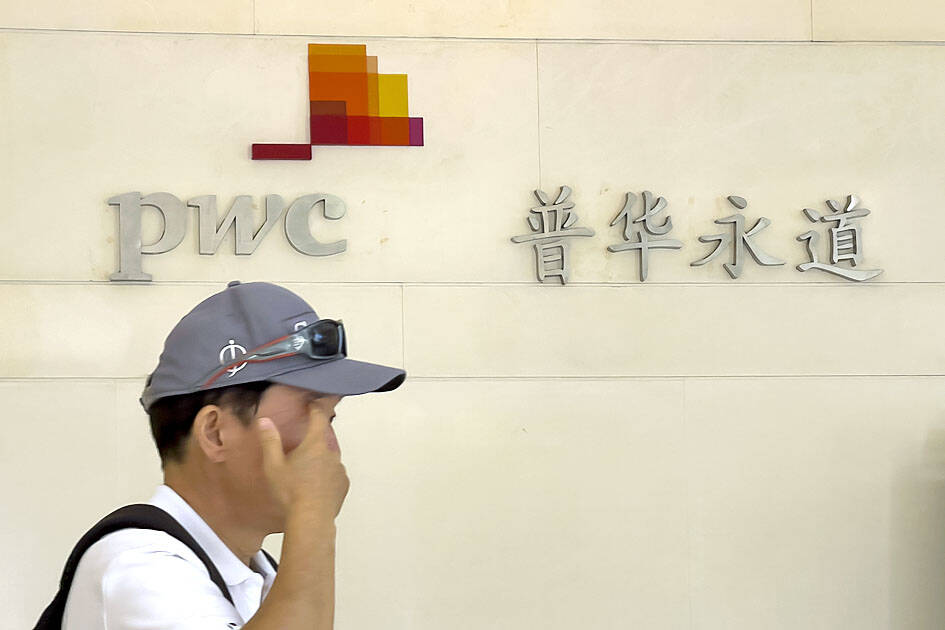Chinese authorities have banned the accounting firm PricewaterhouseCoopers LLP for six months and fined it more than 400 million yuan (US$56.5 million) over its involvement in the audit of collapsed property developer China Evergrande Group (恆大集團).
The punishment is the heaviest yet for international accounting firms operating in China.
PwC would be banned from signing off on any financial results in the country for six months. Already, it has been losing clients.

Photo: AP
The Chinese Ministry of Finance in a statement on Friday said that it was imposing 116 million yuan in fines and confiscation of illegal gains on PwC Zhong Tian LLP (普華永道中天會計師事務所), also known as PwC China, as well as a six-month business suspension, revocation of PwC’s Guangzhou branch and an administrative warning.
A separate regulator, the China Securities Regulatory Commission, also imposed fines and confiscations totaling 325 million yuan on PwC for allegedly failing to perform due diligence in the audit of Evergrande.
The Chinese Ministry of Finance said PwC issued “false audit reports” of Evergrande and that the audit procedures had “serious defects” in design and implementation, leading to many false conclusions.
It also said that PwC did not maintain “professional skepticism” and failed to point out errors and a lack of information disclosure by Evergrande during the audits.
The securities regulator said 88 percent of the records kept by PwC regarding the real estate projects were inconsistent with the actual implementation and were “seriously unreliable.”
When on-site investigations were carried out, some projects were still “a piece of vacant land” despite being considered to have met the delivery conditions, the regulator said.
“The work performed by PwC Zhong Tian’s Hengda audit team fell well below our high expectations and was completely unacceptable,” PwC global chair Mohamed Kande said in a statement. Hengda Real Estate Group Co (恒大地產集團) is the principal subsidiary of China Evergrande Group.
“It is not representative of what we stand for as a network and there is no room for this at PwC,” he said.
The statement said PwC Zhong Tian has cooperated fully with regulators, respects their decisions and would fully comply with the administrative penalties.
The firm is also in the process of issuing financial penalties for current and former firm leaders who were responsible for the business, the statement said.
PwC came under Beijing’s scrutiny after the collapse of Evergrande in January, the world’s most indebted developer and a symbol of China’s ongoing property crisis.
China’s securities regulator in March said that Evergrande had inflated its China revenues by almost US$80 billion in 2019 and 2020.
In May, authorities fined the company US$577 million.
PwC had audited Evergrande’s accounts for 14 years until last year and gave it a clean bill of health.

Sweeping policy changes under US Secretary of Health and Human Services Robert F. Kennedy Jr are having a chilling effect on vaccine makers as anti-vaccine rhetoric has turned into concrete changes in inoculation schedules and recommendations, investors and executives said. The administration of US President Donald Trump has in the past year upended vaccine recommendations, with the country last month ending its longstanding guidance that all children receive inoculations against flu, hepatitis A and other diseases. The unprecedented changes have led to diminished vaccine usage, hurt the investment case for some biotechs, and created a drag that would likely dent revenues and

Global semiconductor stocks advanced yesterday, as comments by Nvidia Corp chief executive officer Jensen Huang (黃仁勳) at Davos, Switzerland, helped reinforce investor enthusiasm for artificial intelligence (AI). Samsung Electronics Co gained as much as 5 percent to an all-time high, helping drive South Korea’s benchmark KOSPI above 5,000 for the first time. That came after the Philadelphia Semiconductor Index rose more than 3 percent to a fresh record on Wednesday, with a boost from Nvidia. The gains came amid broad risk-on trade after US President Donald Trump withdrew his threat of tariffs on some European nations over backing for Greenland. Huang further

CULPRITS: Factors that affected the slip included falling global crude oil prices, wait-and-see consumer attitudes due to US tariffs and a different Lunar New Year holiday schedule Taiwan’s retail sales ended a nine-year growth streak last year, slipping 0.2 percent from a year earlier as uncertainty over US tariff policies affected demand for durable goods, data released on Friday by the Ministry of Economic Affairs showed. Last year’s retail sales totaled NT$4.84 trillion (US$153.27 billion), down about NT$9.5 billion, or 0.2 percent, from 2024. Despite the decline, the figure was still the second-highest annual sales total on record. Ministry statistics department deputy head Chen Yu-fang (陳玉芳) said sales of cars, motorcycles and related products, which accounted for 17.4 percent of total retail rales last year, fell NT$68.1 billion, or

HSBC Bank Taiwan Ltd (匯豐台灣商銀) and the Taiwan High Prosecutors Office recently signed a memorandum of understanding (MOU) to enhance cooperation on the suspicious transaction analysis mechanism. This landmark agreement makes HSBC the first foreign bank in Taiwan to establish such a partnership with the High Prosecutors Office, underscoring its commitment to active anti-fraud initiatives, financial inclusion, and the “Treating Customers Fairly” principle. Through this deep public-private collaboration, both parties aim to co-create a secure financial ecosystem via early warning detection and precise fraud prevention technologies. At the signing ceremony, HSBC Taiwan CEO and head of banking Adam Chen (陳志堅)